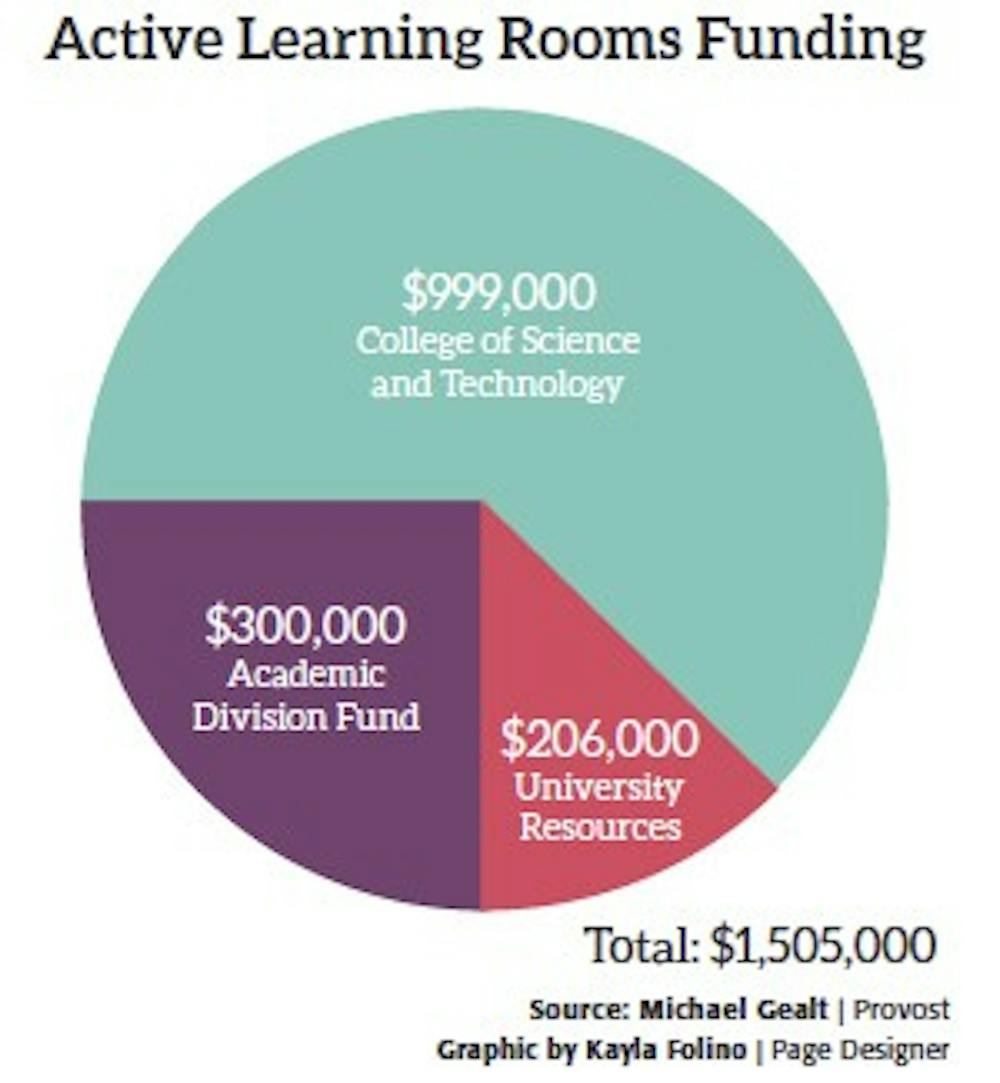BOT Notebook: Construction of Biosciences Building four months ahead of schedule
Construction of the new Biosciences Building is set to begin in July and is predicted to take less time than previously thought.
"I'm happy to report our completion date has been moved forward by four months," said Stephen Lawrence, vice president of Facilities Management Thursday at Central Michigan University's board of trustees meeting. "Working with our construction management company and five of our key subcontractors, we've determined we can get this project done a little quicker. Quicker means spending less money and a lot of the basic costs you have to spend while on a construction site, so that's good news."
Lawrence also presented updates on the Campus Master Plan process. The presentation included updates to master plan proposals based on input garnered from two, week-long open forums, or charrettes. Proposed changes to the Biosciences Building and Warriner Mall were a main focus for the two forums.
A charrette, or forum, will be held in March to discuss possible changes to the Anspach quad, the Admissions Walk, and the Botanical Gardens, Lawrence said.
Proposed Warriner Mall changes sparked strong negative reactions from students and alumni on social media, and included threats of protests. The proposal would move the trees to sidelines of the park area, creating an open, football field-like park in front of Warriner Hall.
"Let's not kid anybody, these change are always tough for somebody," said Board of Trustees Chairman William Kanine. "It doesn't mean it's bad or not good, it's just a matter of 'you've got to wait and see how it plays out.' These are very design oriented thought processes."
Kanine said he believes the improvements are in the best interest for current and prospective students, and the overall beautification of the college.
"We as trustees have the responsibility to maintain the facilities, upgrade them and keep them in the shape that promotes student success," he said. "I think that's what this whole master plan process does."
Trustees approve funding for active learning rooms
Trustees approved $1.5 million in funding to transformation of Dow 108 and Dow 135 into technologically-inclined active learning rooms. The funding comes from the College of Science and Technology, the Academic Division Fund and the University Reserve Fund, said Provost Michael Gealt.
“Through the use of these classrooms, the active learning process is one that has been shown over the years to be much more successful in terms of student success,” Gealt said. “We believe these classrooms will help us retain students, especially freshman to sophomore year, but also throughout the entire curriculum.”
He said the cost of the rooms, which could be in use for the fall 2014 semester, is split almost evenly for technology and the modification of the infrastructure of the rooms.
Trustee Robert Wardrop said the approval of the project's funding aligns with the university's priorities.
“It does hit on our priority number one, which is student success under the strategic priorities,” Wardrop said.
Trustees hear from Divest CMU liaison, discuss SGA's CPF reform
The Student Government Association is looking to increase its Campus Program Funding budget to $2 million, but trustees said they alone cannot act on approving the reform.
"That is not something we as trustees can take up directly," Wardrop said during Thursday's meeting. "(SGA) presented it to us. It will go to Dr. Ross and the cabinet will work on that."
Wardrop said SGA did a very good job on their presentation, including a PowerPoint and a notebook of all the options for adding to the funding budget.
Trustees also heard from Mariah Urueta, a member of the Divest CMU activist group on campus, which is attempting to persuade CMU officials to remove university investments in oil and gas companies. There was no action taken on this matter at the meeting.
"This is just to put it out on the board," Urueta said. "There are currently 250 universities where their students are participating in divestment campaigns, calling upon their colleges to divest their funds and look into other means of creating revenue and income without increasing portfolio risk."
CMU ahead of some national healthcare trends
CMU is bucking some national healthcare trends, according an annual report presented to trustees.
The report indicated CMU's self-funded healthcare program has saved the university and its employees nearly $14 million in healthcare costs, said Lori Hella, associate vice president of Human Resources.
Hella added that national averages of prescription drug plans increased 8 percent from 2012-13, and CMU has been able to decrease its prescription costs nearly two-tenths of a percent.
Overall healthcare costs incurred by the university were also lower than the national average.
Trustee Patricia Mooradian asked Hella if the “culture of health” in the presentation could be translated to students.
“That is something we're very interested in doing,” Hella said. “We've had partners from academic colleges as well as university recreation, who are also interested in expanding that.”
University Editor Ben Solis contributed to this report.




